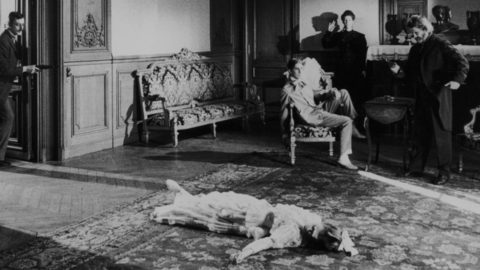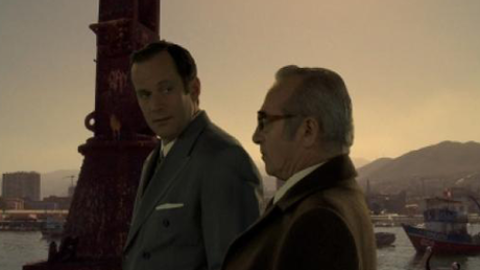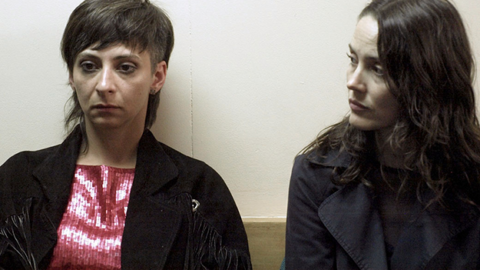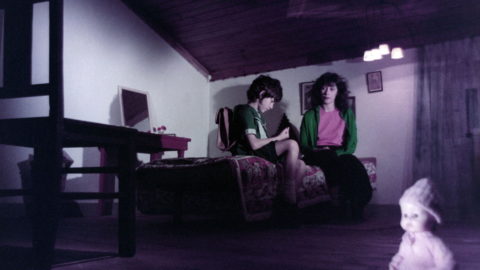Interview: Valeria Sarmiento
The Wandering Soap Opera (La telenovela errante) has its North American premiere this week in part two of Life Is a Dream, the Raul Ruiz retrospective at the Film Society of Lincoln Center. The film has a complicated history, shot by Ruiz before his death in 2011 and completed through the efforts of longtime collaborator Valeria Sarmiento. Last year at the Locarno International Film Festival, where The Wandering Soap Opera had its world premiere, Sarmiento discussed The Wandering Soap Opera and Ruiz’s unique process with Locarno Critics Academy attendee Jaime Grijalba.
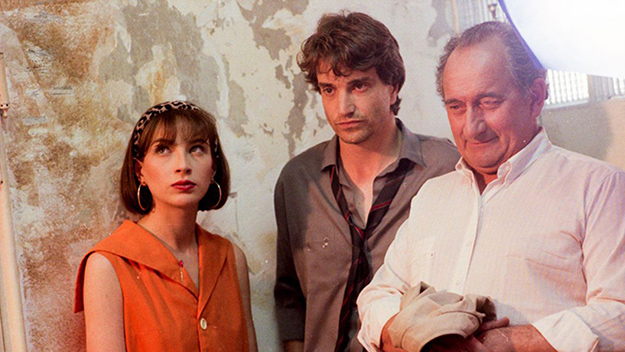
The Wandering Soap Opera
What was the process of finding the film? Apparently it was quite an adventure.
I was in Chile, working on a TV series, and I went to the Cineteca Nacional [Chilean National Cinematheque]. And in the Cineteca they told me that somebody had deposited some negatives of what appeared to be La telenovela errante [The Wandering Soap Opera]. So I said, OK, that’s good, and I talked to Chamila Rodríguez, who is the producer of this film, and asked, what would you think if we try to finish this film? And the search for the materials began.
We found out that at Duke University there was a work copy that Raúl had left more or less assembled, and that in a sound person’s basement there was some sound, and we decided to put all those elements together and finish the film in some way, with two days of shooting. First the Duke people filmed a bit of the work copy and sent it to us to know that it existed, what was left, etc. Then the producer went to retrieve that material, and in the midst of it all, the National Council of Culture and the Arts in the Chilean government gave us some money to finish the film, and that’s how it all came together. I filmed two days, and it was finished.
Which parts of the film did you direct?
If you put together everything that Raúl did, it just turned into a very strange thing. So I decided that we had to divide it into chapters, days, to make it more playful. I filmed old TV sets, and I inserted the footage inside them to give the telenovela the sensation of vertigo that it should have. You don’t know where you are, and then you realize that you’re inside the telenovela, or outside of it, or you’re looking at the telenovela, and the idea was to play with that.
It’s this idea that there’s a parallel world of telenovelas and that people are crossing from one to another. Did Ruiz have a thought-out structure beforehand?
There was a script that was nonsense, really, and if you put the material together, it just didn’t work. So that’s why I decided what the best formula was, because I think that Raul would’ve liked to continue filming and it was left unfinished because he couldn’t get the money to finish. This was the way to finish the film and do it in a way that would be acceptable for audiences—playing with the vignettes, dividing it into days. A structure emerged.
Was it really filmed in six days?
No. That’s fiction.
Ah.
A fiction had to be made for the fiction to come alive.
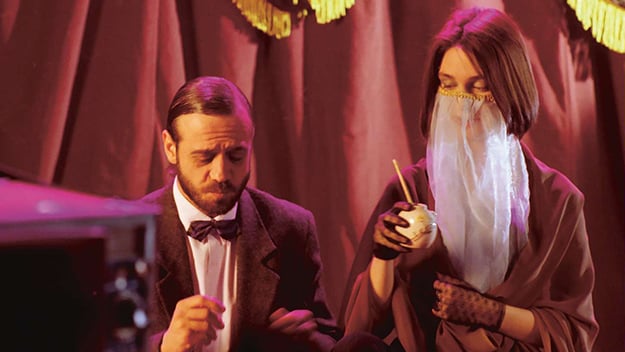
The Wandering Soap Opera
Was La telenovela errante the first thing that Raúl filmed when he came back to Chile after the end of the dictatorship?
No, he made some short films before this.
But it was the first big project that he did that would become a feature.
It was a workshop. Raúl’s idea was to do a workshop with actors and technicians. I think that Raúl always liked to teach. He taught at Duke University, at Harvard, in Paris, he taught in many places. And he always wanted to create a workshop in which he could communicate his way of filming and directing actors. That’s how this project started. So Leo Kocking, who had some study space in the back of his producing company, provided the camera, some actors came, and it all came together as a workshop.
So La telenovela errante was a kind of practical exercise from this workshop.
Exactly. With Chilean actors and technicians in the year 1990 who were all curious to know how Raúl worked.
It’s amazing how Raúl manages to immediately sense the state of Chile at that time in 1990, without really having been there that long. How long had Raúl been away from Chile?
We had been out of Chile for 10 years and we started going from time to time since 1984 to see the family, hiding out. And let me tell you, they rang our doorbell in the middle of the night to tell us, “We know you’re here.” So we came to see the family, and we had observed how Chile had turned into a country with a savage capitalism—terrible. Everyone was talking about hidden tombs that had been found. And all of those elements appeared in Ruiz’s fictions. He had a good nose—that was important.
Did you collaborate on all of Ruiz’s films?
No, not all of them.
But he always talked with you about his projects, and you with him about yours. And the Chilean spirit never truly abandoned him.
He didn’t lose that. He used to say, “The Chilean-ness can’t be washed away, not even by going to the Virgin at Lourdes.”
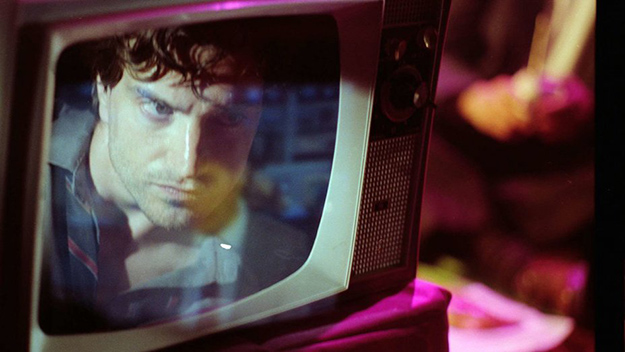
The Wandering Soap Opera
In La telenovela errante he talks about things that not many would have dared to speak of in a movie made in 1990. It’s not like the Argentinians, who three years after their dictatorship ended had a film about it that won the Oscar.
But it was mostly in passing. For example, about the tombs, a character says, “Bury this person instead of that one,” because that was happening. It’s only a line. Or when they talk about capitalism, or money, or enterprise. And when the fruit was poisoned, there was a scandal with poisoned grapes.
Everything appears in some way.
In one way or another.
Was it like a game? Was it always playful the way he put these elements in?
Yes. They were observations that were necessary for him to speak about those things.
Were you present when La telenovela errante was being filmed?
No, because I was finishing Amelia Lópes O’Neill in Europe, and he was filming in Chile.
Are there similar projects coming up, to try and recover old Ruiz films?
Yes. There are many films that we want to rescue. In France there’s an association that was created, Les Amis de Raoul Ruiz, and we’re working a lot with them. For the retrospective at the Cinémathèque française [in May 2016], we rescued 18 films or something like that—they were restored. But beyond that, there are movies we have to search for and complete: for example, there’s a film in Taiwan that is great. I saw the dailies; they are very beautiful. That movie has to be rescued. Then there’s the first film that Ruiz made in Chile, which he didn’t finish, El tango del viudo [The Widower’s Tango], and this also needs to be rescued.
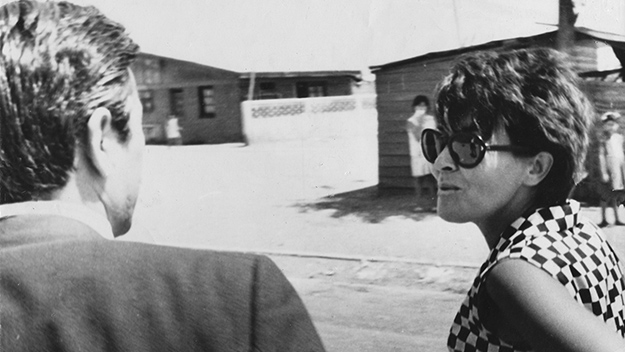
Tres tristes tigres
Did that come before La maleta [The Suitcase, 1963]?
Before Tres tristes tigres [1968].
Was it a feature or a short?
I think the idea was for it to be a feature, but he didn’t film everything he needed. That will be more complicated to finish, because we’re going to have to make up a fiction around it to do so.
What would Raúl have thought of mounting fictions upon fictions? It sounds like something he’d do.
No, of course he would’ve liked it.
What was the process when you and Raúl worked together on projects? I saw in the credits of The Suspended Vocation [1978], for example, that you were the editor. Did you always do the editing or did you do something else?
I edited many of Raúl’s films, but let me tell you the way Raúl did it. He arrived at the editing bay in the morning, asked for what he wanted, and then he walked out because he didn’t like being incarcerated in that room. Then he came back at the end of the day to see what had been done, whether he agreed with it, and we talked, etc. Often he told me what he wanted over breakfast, because he didn’t even want to come near the editing room.
He didn’t like the editing process?
No. He didn’t like being in closed rooms.
He preferred to walk around?
Sure. And it was a way to have so many films.
Always making movies, and you editing away! I’m curious about your film Lines of Wellington [2012], which Raúl was going to direct but sadly he passed away. How was it for you taking the reins of that project?
Raúl didn’t film anything. He only prepared the shoot. And after the preparation he returned to Paris and died there. He had told me that he felt very weak, and at that time he said, “Valeria, I think I’ll need you to help me in this movie.” In the end it was more than that: I had to direct it alone. But the crew and everyone were extraordinary—actors came, sequences were added to pay homage to Raúl. Isabelle Huppert, Catherine Deneuve, Michel Piccoli—everyone wanted to be part of the film to demonstrate the affection that they had for Raúl.
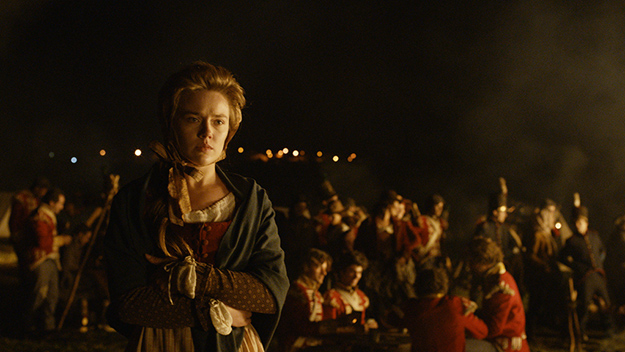
Lines of Wellington
And how was it for you directing?
Raúl undoubtedly would have made another film, a longer film—he would have added more stories. I just shot the script as written by Carlos Saboga, and that was that.
Were you here in Locarno when Tres tristes tigres premiered in 1968 and won the Golden Leopard?
No. We knew each other, we were a couple, we saw each other, but I stayed in Chile and he came to present his film.
Regarding Lines of Wellington, did you take it as an aesthetic challenge? It was a large project compared to those you usually do.
I don’t know, you tell me. This “little package” just fell into my lap. At first the producer thought of giving it to John Malkovich, and later he said, “It’s better if you direct it,” because I had worked with him on other productions. And that was that. It was a very big production, the number of people. But it went very well, very calmly, and we filmed it all on schedule. The film was made, the TV series was made.
Ruiz was somewhat obsessed with TV. He started on it thematically but he ended up making TV miniseries and being part of French TV. And now we see this more direct relationship in La telenovela errante.
Raúl started writing for theater. Then he wrote telenovelas in Mexico. So it was part of his interests.
And later with La recta provincia [2017] in Chile and other miniseries, he found a way to experiment with the format.
Yes. He always saw that as a way to find work, because he always wanted to invent something new in what he was doing.
Jaime Grijalba is a freelance film critic (MUBI, Kinoscope) and filmmaker based in Chile, and a programmer at the Valdivia Film Festival.



